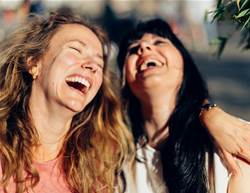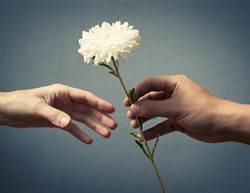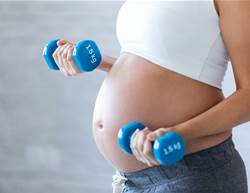In my 20s and 30s, children were not something I dreamed about having. And then in my later 30s and into my early 40s, they became something I feared I would never have. As I thought about what the rest of my life would look like, that suddenly seemed like a loss, instead of a decision I had made. But because of various issues—I wasn't partnered up for that stretch of my life; I didn't feel financially stable enough; I didn’t feel brave enough—I didn’t think I had the stamina to pursue single motherhood. I had also suffered a really bad back injury that left me unable to walk or work for a while, so it seemed as though having children wasn't going to happen for me.
Then I met my husband, Dave, in 2004. He had been married previously; I had never been married. After two years together, when we were both 47, I assumed he knew that children weren’t likely to happen for me. But one night we were out having cocktails, and after several mojitos, I turned to him and asked, "Did you ever want children of your own?" And he said yes. I assumed that was the end of the road for us. We weren't engaged or married, and so it seemed to me that I should let him go off and find someone he could have children with. I told him that if children were something he wanted, it wasn't going to be easy with me; that we had reached a crossroads here. But he said that more than anything, he wanted us. If children happened, it would be wonderful, but ultimately what he wanted was to be together.
So, we started talking about it, and the more we talked, the more I wondered if having a baby actually wasn’t impossible for us after all. I had pursued getting pregnant in my early 40s—even enrolling in a program at NYU to begin treatments for IVF—but I had to withdraw when my back problems began. After my husband and I revisited the topic, I decided to find out what our options were.
When I brought up the topic with my doctor, her eyes went immediately to my chart. I could see she was looking at my date of birth. Then she met my gaze directly and said, "No one will talk to you unless you consider egg donor IVF." I told her I understood. I didn't know a lot about it, but I had assumed even before coming in that that would be the option I would be presented with. She gave me a list of five clinics. The first four that I called asked for my date of birth and then practically hung up on me. The fifth one finally told me they would treat patients over the age of 44 in the egg donor program, and transferred me over to the coordinator, which is where it all began.
It took almost two years to get all my tests done and raise the money we needed to continue. The matching takes a few months once you've passed all your tests and prepaid for the cycle, to the tune of about $30,000. Then we had two cycles that ended without eggs being produced. Third time was a charm. I was 50 when I had the embryo transfer procedure.

For us, matching with a donor was a very emotional experience. The clinic we used recruits and screens anonymous egg donors using a double-blind process, and I have to say that one of the downsides for me is never being able to thank our donor in person. She gave me the greatest gift I'll ever receive, and she'll never even know how grateful we are, or how we treasure our son. She doesn't even know that he exists. But, it was her choice to choose a clinic that is a blind donation, so I respect that. She preferred to donate and move on with her life. She could have used a clinic that allows contact or open donations, but she didn't.
On my side, I had to go through a tremendous amount of screening also, before I was accepted as a candidate. It took me months to get all the appointments and tests done—EKG, chest X-rays, bloodwork, screening by a maternal fetal medicine specialist, or high-risk OB/GYN, and full gynaecological exams including tests to determine that my uterus was capable of carrying a fetus to term. It was exhaustive and exhausting, but I understood the reasons. Of course I'd rather know if I had a condition that would prevent me from carrying a healthy pregnancy to term before we started. My husband had to masturbate into a cup. Life isn't always fair.
During my pregnancy (at age 51), when I started to show, several women at my work approached me and said, "I know I'm not supposed to mention pregnancy in the workplace, but can you please tell me what's going on, and can I have your doctor's number?" So that kind of gave me the idea that what we were going through was going to be something that was going to happen more and more as our generation reaches its 50s.
My pregnancy was as easy as a pregnancy could be. I had my discomforts, but nothing different than what a pregnant woman of any age might experience. One of the most unexpected but gratifying things about being pregnant in my 50s was having other women—virtual strangers, sometimes—approach me and ask me, "How?" and being able to share my story with them, recommend my doctors, or just listen to their stories about infertility and hope. Honestly, not a single person said anything negative to me. I have an amazingly supportive group of friends and family. If people beyond my circle of lovely friends had a negative opinion, that's their right, but it means nothing to us. There are going to be a lot more older parents from now on—maternal and parental ages are trending upwards. We may be on the edge of the wave, but the flood is coming.
I had a medically necessary scheduled C-section, so I was thoroughly prepared and had a very positive experience. I was up and walking in the hall within hours of the delivery. I carried my newborn son up the four flights of stairs in our walk-up apartment building three days after he was born. My doctor even told me at my 6-week checkup that my pregnancy and recovery had been so routine that she wouldn't hesitate to clear me medically if we decided that we wanted to try for another baby. But we considered ourselves remarkably lucky to have this gorgeous, healthy baby and had no desire to push our luck!
I come from an Irish family where everything's a secret, so I'm a firm believer that anything you try to keep hidden is going to come popping out at the worst possible moment and be 15 times harder to deal with than it should have been. So, from the moment my son could hear my voice, we’ve told him the real story of his origins. We say, "Mummy and Daddy are old enough to be your grandparents, and we're probably as old as some of your friends' grandparents are. People may say things about that, but Mummy and Daddy’s feelings aren't going to be hurt, and your feelings shouldn't be hurt." He's 6 now, and sometimes he'll sit and blatantly tell people, "Mummy was a little bit older, so she needed to borrow an egg from another nice lady and mix it with Daddy's sperm.” We’ve always been open and honest with him. Any question he has, we answer as transparently as we can.

Occasionally, someone will refer to me as my son’s grandmother instead of his mum, but because we live in New York City, we really don't get a lot of questions. There are a lot of older parents here. Even in my son's first grade class now, I'm definitely the oldest mum, but really not by that much. So, there is a community for us here. We pretty much made the decision that we are not going to leave New York for that reason, among others. New York is our cocoon, our bubble. It's a place where we can move among like-minded people and get very little attention.
I honestly have to say I'm a better mother because I’m older. I would have been a nightmare as a mother in my 20s and 30s. I have patience now that I can’t explain. I think because my husband and I have been through so many life experiences, we sincerely don't sweat the small stuff. We almost approach parenthood with that kind of ethos that grandparents are noted for—mellowed after having their own children and fighting their own battles. Dave and I call our parenting style "good cop and gooder cop." We both grew up in the '60s and watched parents and children tear each other apart over nonsense like too-short skirts and too-long hair. We are determined NOT to make issues of fad and fashion. There will be much bigger battles to fight, so why waste our energy over what amounts to silly problems? Our time with our son may end up amounting to a small fraction of his total time on Earth. Since we may not be around into his later life, we want to give him all the tools to be a good person and make good decisions based on kindness and caring, and that has to be done by example and not by threat.
The other sweet and amazing thing is that the children of my friends who had children in their 20s and 30s are now in their 20s and 30s themselves. Our son has this amazing ecosystem of people who just want to nurture him. I apologise to these friends all the time now, because I just didn't know what they were going through back then. I had a different life—I was single, footloose, fancy-free. I didn't understand the pressures they were under. They support me now in ways that I never supported them, and I am eternally grateful. (Every woman needs these 7 types of friends in her life.)

Some people say having children when you’re older is selfish, and I can see that side of the argument. But I would also ask those people if life has turned out the way they thought it would. Did everything go according to plan? Did they meet the right person when they were 25, and did they have 2.5 children by the time they were 30, and did they get that promotion, and did all these things fall into place for them? Or did life intervene and lead to different decisions? The truth is, you can do everything "the right way" and things still may not work out how you planned. You may not be around later on, even if you have your children when you're young. Dave and I have accepted that we need to do everything we can to remain vital. We joined a tennis and swimming club the past two summers so that we can get out of the city and exercise with our son. We eat a Mediterranean diet—I don't eat meat, although I do eat fish. We try to eat organic fruits and vegetables from local farmers' markets as much as possible. We try to limit fast food to once a year as a guilty pleasure. We absolutely have to change our mindset of what the "golden years" will look like for us. We want to make sure that we give our son the best life that we can.
I try not to judge anybody else's idea of family or parenthood because I don't want to be judged. But I think that wanting to adjust the entire course of your life to make another person's life on Earth great kind of defines parenthood. I think that's what all parents ultimately strive to do, no matter how old they are when their journey begins.










